8 Tips to Build a Home Inspection Website

Contents
You might be banking on referrals to feed your home inspection business, but don't kid yourself: Your website is the most important marketing tool that you have. It will work for you 24 hours a day, and every agent you meet will visit to make sure that you're a legitimate company. That means you need to be easy to find, easy to contact, and even easier to do business with.
A well-designed home inspection website will get the phone ringing and your notification bells going off. An amateurish-looking site will sap your business around the clock. In fact, 75% of users admit to making judgments about a company's credibility based on their website's design according to the Web Credibility Research from Stanford.
Similarly, "57% of internet users say they won't recommend a business with a poorly designed website on mobile." Those are fatal outcomes for not having a site that meets users' standards. Or worse, they won't find you at all without a website in the first place.
In 2022, with social media being a viable marketing tool, it may be tempting to exclusively use social media in place of a website. Don't. People still overwhelming use search engines to find professional businesses, and having a site can drive other channels like email marketing and blogging. If you're looking for the most effective way to boost your company's brand reputation, reach, and — ultimately — revenue, it's time to build a (killer!) website.
Why a website will always matter
Every business has a website these days, but that doesn't mean you should phone it in just to check the box. A website is a business-critical asset. Here's why:
- You control how your business is presented. This means you can show the best photos, the most glowing reviews, and give your visitor a great user experience. In a perfect world, everyone would be introduced to you through your website, instead of on social media or a review site.
- You can convert visitors into customers. Social sites make it hard to guide your visitors off their site. But a website allows you to build a process to guide visitors into customers. You can add calendars for easy appointment setting, contact forms, and even AI chatbots.
- It's how prospective leads find you: According to HubSpot's research into local businesses and SEO, "97% of people learn more about a local company online than anywhere else." Without a website, you can't easily make contact with the vast majority of potential leads. Websites also operate 24/7 (especially with chatbots and appointment-setting tools) so you can continue to generate leads even when you’re out of the office).
- It's a long-term investment with a high ROI: When you have your own website instead of relying on third-party profile pages, your brand builds momentum through continual search engine optimization (SEO) best practices. Over time, your website can gain higher domain authority, rank higher in search engine results, and be more visible to your target market. Even better, you own that digital real estate.
1. Use a simple domain name
Pick a name that's short, easy to spell, and even easier to remember.
Think about what would happen if someone forgot your exact URL but tried to put what they did remember into a search engine. Would your website pop up? The last thing you want is a domain that readers struggle to connect with, especially if you expect to get a lot of business referrals through lenders and agents (who frequently give referrals over the phone).
Pro tip: While you're finalizing your domain, be sure it's not too similar to a competitor — you don't want to send them your traffic!
2. Be clear about the services you offer
Every page of your website — especially your home page — should describe what you do and what areas you serve. Visitors quickly leave web pages that are confusing or don't look useful. These details should stay above the fold, such as on a headline banner. Include verbiage that shows you understand the pain points your clients face, and how your expertise and experience solve those problems, rather than writing lengthy paragraphs detailing your career history. When visitors are able to easily visualize themselves in your messaging, you are more likely to convert them into paying clients.
3. Feature yourself
Solo home inspectors sometimes try and make their business seem more corporate than it really is, in the hopes that they'll fool customers into thinking their a larger company. Don't do this. When was the last time you had a great customer experience with a giant corporation?
Home inspection work naturally creates a face-to-face relationship, you want to start building that relationship early on. Be the face of your company with high-quality images or even a welcome video on our website.
Featuring yourself increases trust, demonstrates authenticity, and makes you more recognizable. It's also a great strategy for building your personal identity in an industry that thrives on referrals and contacts.
4. Keep your site clean
Busy sites look cluttered and unorganized, especially on a mobile device. This results in that negative judgment we mentioned earlier, and that's bad for business. Cluttered sites are also often slow to load, which is a turn-off for both SEO and real people. Your site should load in less than one second. So opt for a clean site that loads quickly.
Also, be sure that the content itself is clean-looking and skimmable. Keep paragraphs short (about fifty words or less), use bullet points and lists, include attention-getting statistics, and break up sections of text with images and call-to-action buttons.
5. Make it easy to navigate
If we're being honest, almost everything a visitor needs should be on your homepage. If your website is hard to navigate or visitors can't immediately find what they're looking for, they'll "bounce" — or leave your website without navigating to a second page.
According to RocketFuel, "Most websites will see bounce rates fall somewhere between 26% and 70%. " This is something we've all experienced: a promising link appears in the search engine results, you navigate to the page, and then it doesn't have anything you need. This experience is frustrating and interruptive for online visitors, so it's the last thing you want for your website.
Prioritize easy navigation by having a clear navigation bar with helpful links, pages that are clearly labeled, and a website that follows standard organizational practices.
If you use an online scheduling tool (and you should) feature it prominently on your home page.
6. Optimize your site for search engines
SEO is both back-end and front-end things you put into place to ensure your website overall can be easily indexed and cataloged by search engine algorithms like Google.
Basically, if a search engine can identify the purpose of a page and determine if it's a good fit for a user's query, that page will rank higher in the search engine results. Clear language, good formatting, and metadata can help optimize your pages.
Many DIY website builders like Wix or Squarespace have SEO best practices you can follow. But for more advanced stuff, you'll need to either hire someone or watch a lot of YouTube.
7. Create content and use it
Content marketing is the process of creating articles, how-to pages, FAQ pages, and blogs to educate your clients and strengthen your SEO practices. You can even create content on Instagram, TikTok, and other social media platforms and put it on your site. But don't just post content and wait for someone to read it. Send it to agents, start a newsletter, or use the articles as scripts for social media content. Think of ways to reuse and stretch your content further. In the video below, we used a blog article as a script for a YouTube video. Later, we used a shorter version in our Instagram reels.
8. Hire out
For a new home inspector on a budget, the thought of paying thousands of dollars for anything is often a hard no. But actually, you don't have to spend insane money to get a great site. Spectora bundles a year of the app with a new website for $2199. When you break down the price, you're getting a website and professional hosting for just $700, which is way cheaper than a web design team would charge. Plus, Spectora knows what a home inspector site is supposed to look like. You won't have to worry about rookie mistakes on your site, like pictures of guys with hard hats.
Whether you want someone to handle all of your web design tasks and updates or you're looking for a team who can build your site and then teach you how to make changes over time, Spectora is here to help. Contact us today to learn more about how we've helped thousands of home inspectors build up their businesses online, or tell us what you're looking for in your new business website.
